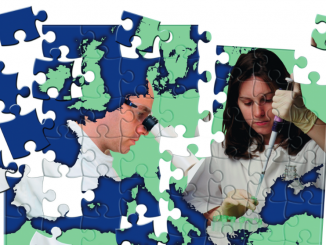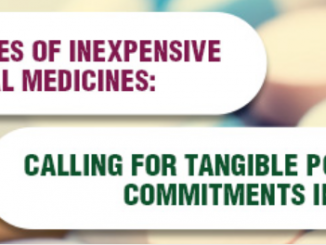The cancer community is deeply concerned about the unintended consequences of the current wording of the European Union (EU) draft Regulation on Data Protection, which may challenge the survival of retrospective clinical research, biobanking, and population-based cancer registries in the EU. This directive could negatively affect Europes competitiveness in cancer research.
This article was first published in Nature Reviews Clinical Oncology vol.11 no.10, and is published with permission. © 2014 Nature Publishing Group. doi:10.1038/nrclinonc.2014.148
One of the traditional strengths of European cancer research has been the quality, depth and coverage of its cancer registries, which offers the potential to link demographic, clinical and genetic data to explore phenotype–genotype correlations. The Northern European registries in particular have made consistent and important contributions to the international literature on epidemiology and outcome studies.[1] These resources are all predicated on convention and the societal urge to share knowledge, and ultimately wisdom, so data can be pooled and can contribute to ‘big science’. The identity of individuals is anonymised and is, therefore, protected; nevertheless, when asked directly, the vast majority of patients with cancer are keen to contribute in any way they can to the wider research agenda.[2]
The European Union (EU) has undertaken a review of data confidentiality and data protection given the extraordinary advances that have been made in transnational electronic data transfer and the potential for data sharing to infringe on an individual’s rights to privacy. The current EU Data Protection Directive (95/46/EC) did not consider important technological developments, such as social networks and cloud computing; therefore, legislators determined that new guidelines are required and have proposed an amendment in the form of the General Data Protection Regulation (GDPR).
Paolo Casali[3] has produced a position paper on the EU GDPR, endorsed by Europe’s leading cancer research organisations, in response to anxieties induced by the wording of one of the amendments (191 to Article 81) to the GDPR. The amendment could be interpreted as imposing the requirement for researchers to ask for a patient’s ‘specific’ consent every single time new research is carried out on already available data and/or tissues. Consent would also be required for the recording of data in population-based disease registries, which by definition need be all-inclusive – that is, collection of all of the data for all individuals belonging to a given population is mandatory if the information is to be truly reflective.
All of us in medicine understand the need for confidentiality and data protection, but this legislation could have a far-reaching set of unintended consequences. Apart from deconstructing world leading cancer registries, it will place an enormous barrier to translational cancer research. In Oxford, the cancer trials office has led the UK’s adjuvant colorectal cancer trials portfolio for the past 15 years, generating a bioresource comprising 5,000 to 6,000 germline DNA and tissue samples that have been pseudo-anonymised and linked to the trials databases. Such a resource enables clinically relevant outcomes, such as survival and toxicity, to be captured. This repository has proven to be an enormously powerful biobank, which has been used in international collaborations across four continents, providing insights into the genetics and biology of colorectal cancer susceptibility, prognosis, and genesis of chemotherapy-induced toxicity.[4–7] All samples were gifted by patients recruited to these trials through a separate process of consent (98% of patients recruited to the trials also consented to sample collection and storage) for future research, which was broadly specified, given the relative impossibility of defining what future technical innovations might drive the research agenda. This resource has generated several patents and provided the evidence base for two of only three biomarkers that are sufficiently clinically validated for routine use in the management of colorectal cancer.[8,9] Approximately 35% of patients recruited to the trials have suffered recurrence, and have died; thus, such patients are of course beyond the means of re-consent. This biobank could potentially be rendered redundant by the proposed amendment to the Data Protection Directive, which would create a significant practical barrier to the development of companion diagnostics for novel anticancer drugs.
Companion diagnostics or predictive markers are often validated in so-called retrospective–prospective studies, whereby a prospective trial of the relevant anticancer drug and associated biobank are interrogated at some interval after the trial has closed, to explore the relationship of some new marker with drug efficacy or toxicity. Having to regain consent from every patient every time researchers want to test a new hypothesis, using a biomarker that might not even have been on the horizon when the trial was performed, places an impossible burden of care on the research team and runs counter to the initial gift made by the patient. Of course we must put in place a legislative framework that protects data confidentiality, allied to transparent mechanisms to oversee retrospective research projects (for example, the Local Research Ethics Committee or Institutional Review Board) and storage of patient tissue in biobanks, but most EU Member States have existing laws that function perfectly well in this regard.[10]
“Having to regain consent from every patient … places an impossible burden of care on the research team…”
Casali finishes his article with a strong plea, and one which I echo, “The European cancer community urges all EU decision makers to save research, as well as to protect the right of patients to donate their data and tissues to advance research and find cures. EU decision makers are urged to change the European Parliament Amendments 191 and 194 to Articles 81 and 83, as they would impair public health research within and across EU Member States.”
References
1. R De Angelis et al. (2013) Cancer survival in Europe 1999–2007 by country and age: results of EUROCARE-5 – a population-based study. Lancet Oncol 15:23–34
2. V Speirs and A Morgan (2013) Breast cancer: investment biobanking – increased returns from tissue samples. Nat Rev Clin Oncol 10:128–129
3. P Casali (2014) Risks of the new EU data protection regulation: an ESMO position paper endorsed by the European oncology community. Ann Oncol 25:1458–61
4. D Rosmarin et al. (2014) Genetic markers of toxicity from capecitabine and other fluorouracil-based regimens: investigation in the QUASAR2 study, systematic review, and meta-analysis. JCO 32:1031–39
5. D Church et al (2014) ‘Toxgnostics’ an unmet need in cancer medicine. Nat Rev Cancer 14:440–445
6. R Salazar et al. (2011) A gene expression signature to improve prognosis prediction of stage II and III colorectal cancer. JCO. 29:17–24
7. C Palles et al. (2012) Germline mutations affecting the proofreading domains of POLE and POLD1 predispose to colorectal adenomas and carcinomas. Nat Genet 45:136–144
8. P Quirke et al. (2011) Value of mismatch repair, KRAS and BRAF mutations in predicting recurrence and benefits from chemotherapy in colorectal cancer. JCO 29:1261–1270
9. RG Gray et al. (2011) Validation study of a quantitative multigene reverse transcriptase-polymerase chain reaction assay for assessment of recurrence risk in patients with stage II colon cancer. JCO. 29:4611–19
10. Human Tissue Authority. Human Tissue Act 2004.
Author affiliations
Department of Medicine, Nuffield Division of Clinical Laboratory Sciences, John Radcliffe Infirmary, Oxford, UK





